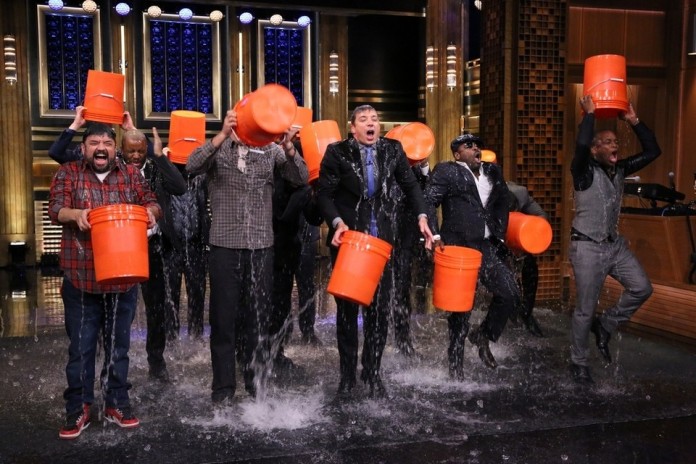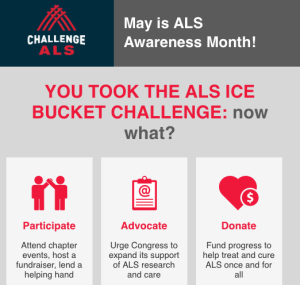
“Thank you so and so for the nomination for the strikeout ALS ice bucket challenge, I nominate…” This was the “it” social media trend of the summer, and it felt like everyone I knew was getting nominated. While it raised over $100 million for the ALS association, I continued to wonder if people truly understood ALS and what it means to have it.
May is ALS awareness month, which has me thinking a lot about my great Uncle Charlie, who was a really special guy. For most of his adult life, he was a pastor in Forest Hills, New York, and I’ll never forget the the Easter that my family visited him in Queens. He treated us like royalty and welcomed us completely into his life. Every summer, he would come to Ohio for a visit and we would swim in the lake and muse about life while sitting in the wooden rocking chairs on the porch. We sent long emails back and forth throughout the year and his perpetually positive outlook on life always inspired me to do my part in making the world a better place, in any small way that I could.
In September of 2008, after forty-three years with the Presbyterian church, Uncle Charlie decided to retire. Unfortunately, the following June, he was diagnosed with amyotrophic lateral sclerosis, also known as ALS, or Lou Gehrig’s Disease. ALS is a progressive neurodegenerative disease that affects nerve cells in the brain and the spinal cord. Over time, the ability of the brain to initiate and control muscle movement is lost and complete paralyzation usually occurs in the later stages of the disease. My Uncle Charlie had only three years of retirement, and although the disease eventually overtook his body, in his typical fashion, he made the most of the time that he had on this earth.
While he was still able, he traveled, read, swam, played bored games, and spent time with the people he loved. He even wrote me a 20-plus page family history. Being that I usually only saw him once a year, I remember being so taken aback by his deterioration. In those three years and those three visits, he went from walker to wheelchair, to complete immobilization and loss of speech. He could no longer write me weekly emails or travel to visit us and I would torture myself thinking about him as a prisoner in his own body, dreading the inevitable. Luckily, he lived such a full life that he will be celebrated in my heart and the hearts of so many others. If you participated in the ALS challenge last summer, I commend you for raising awareness, but encourage everyone to be more educated about this disease.
What you should know:
A little over 5,600 people in the United States are diagnosed with ALS each year and about 30,000 Americans have the disease at any given time. Only about 5 to 10% of all ALS patients appear to have genetic or inherited form of ALS. Half of all people affected with ALS live at least three or more years after diagnosis, not many live more than that. This urgent medical need for effective ALS therapies has become the springboard for research and drug development efforts at the nonprofit organization, ALS Therapy Development Institute.
Why you should care:
ALS is 20% more common in men and the onset is usually between ages 40 and 70, with an average of 55 at the time of diagnosis. That being said, it can also affect people in their twenties and thirties. Last year, The National Institutes of Health allotted $40 million to ALS research, which is $10 million less than what is spent to research Attention Deficit Disorder ($50 million) and $22 million less than it spends on anthrax research ($72 million). Although the Ice Bucket Challenge, which went viral last summer, increased donations by 1100%, this fatal disease is still getting significantly less attention than other less life threatening disorders. Out of 1,000 people with a history of giving to philanthropic causes surveyed by the ALS association, nearly everyone knew about diseases like HIV/AIDS and only about half were aware of ALS.
What you can do:
Although once a diagnosis is made, the only thing to do is to manage the disease with medication and make sure the patient is comfortable, the ALS Association does a great job of raising awareness via their website and social media accounts. This month, they launched a “31 ways in 31 days” campaign that provides ideas for increasing awareness and funds for research, including registering for a Walk to Defeat ALS and sending letters to Senators and Congressmen to increase ALS awareness and promote legislation, and becoming an advocate.

The truth is, I had never thought much about ALS until I lost someone I loved to it. Think about how much advocacy there is for other illnesses and patients affected – and still there exists a need to keep striving for visibility and developing effective treatments. Those affected by ALS and their families deserve our support and attention. Together, we can change the future of ALS therapy, discover more effective methods of care for those affected, and ultimately, finding a cure.
Featured Image via screen grab from The Tonight Show Starring Jimmy Fallon.


















